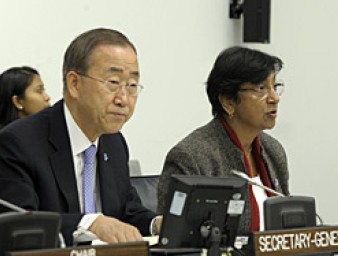Solidarity for a globally sustainable future
19 October 2011

“The notion of solidarity has defined the work of the United Nations since its inception, drawing together nations and peoples to promote peace and security, human rights and development,” said Virginia Dandan, the newly appointed UN Independent Expert on Human Rights and International Solidarity.
As she presented her vision and plan for her three-year tenure to the Human Rights Council in Geneva, Dandan recalled that the Millennium Declaration characterised solidarity as one of the fundamental values for international relations in the 21st century. The independent expert committed to present a draft declaration on the right of peoples and individuals to international solidarity before the end of her term in 2014.
“Threats to peace and security, poverty, water scarcity, population pressure, the adverse social and economic effects of globalization including its impact on labour and migration, as well as the misuse of natural resources … are but some of the most serious constraints to a sustainable futureduring this century,” she said. “These grim realities reinforce the argument for the elaboration of a right to international solidarity.”
According to the Millennium Declaration, international solidarity requires managing global challenges in a way that distributes costs and burdens fairly. This concept was reaffirmed in 2010 by consensus at the Human Rights Council.
The independent expert expressed her intention to address what had been an apparent lack of understanding of the relationship between human rights and international solidarity, and the need to listen and learn from the diverse views regarding the concept.
“During many years of working with grassroots communities I have witnessed how solidarity can effectively bring people together to overcome obstacles in the fulfilment of human rights and development." Further dialogue, she said, will also hopefully occasion a meeting of the minds on points that have been raised in the arguments for and against the concept of a right to international solidarity.
“In my humble view, solidarity far exceeds the sense of a simple common bond . It is a persuasion that combines differences and opposites, holds them together into one heterogeneous whole, and nurtures it with the universal values of human rights,” Dandan said. “International solidarity therefore does not seek to homogenize but rather, to be the bridge across those differences and opposites, connecting to each other diverse peoples and countries with their heterogeneous interests, in mutually respectful, beneficial and reciprocal relations, imbued with the principles of human rights, equity and justice.”
19 October 2011

VIEW THIS PAGE IN:


